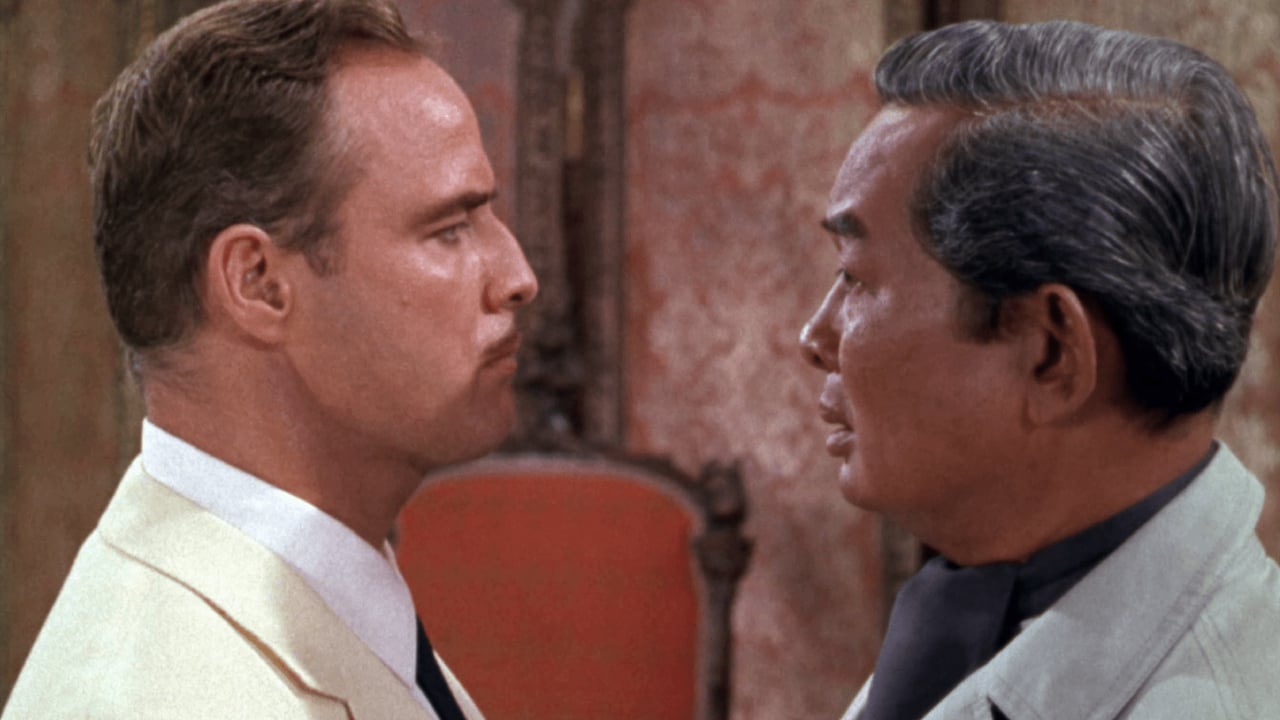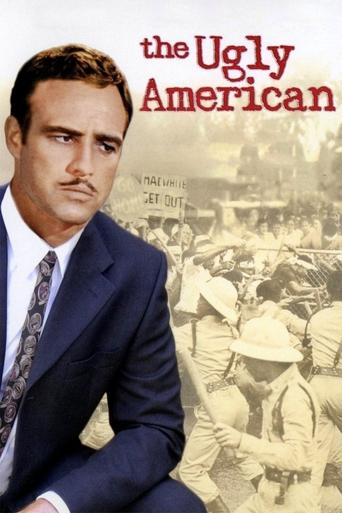



Good start, but then it gets ruined
The best films of this genre always show a path and provide a takeaway for being a better person.
View MoreAmazing worth wacthing. So good. Biased but well made with many good points.
View MoreThere's a more than satisfactory amount of boom-boom in the movie's trim running time.
View MoreI remember first seeing "The Ugly American" upon its initial release in 1963, and I equally remember immediately linking it with what was happening in Viet Nam. I found it absorbing and timely then just as I do today. As the American ambassador with a total white hat/black hat mentality, Marlon Brando in my opinion gives one of his best performances. There's the shouting and the strutting, but there are also some very, eerily quiet, contrasting moments when he simply lets the frustration of his character all hang out. As his former best friend and now rebel leader of the fictional Sarkan to which Brando's Ambassador White has been posted, Ejii Okada is every bit Brando's equal. Their sharp exchanges are riveting, as is so much of the dialogue in this film, dialogue-heavy moments that I do not personally find boring because what they are discussing strikes me as being as important today as in 1963 when this film was first released.I do recognize that some reviewers were terribly disappointed (maybe even offended) that the film was not a recapitulation of an apparently well written, highly complex novel which I haven't read yet but intend to if I can find a copy. However, no matter how great the book, shouldn't a film be judged as a film because it is not a book? For one thing, movies don't have the luxury of an endless running time, a constraint not put upon the number of pages needed to tell a print story. Also, is not the punctuation, grammar and syntax of image quite different than that of print? Finally, as others have said, it is too bad (a) "The Ugly American" has been mostly forgotten (if it has ever been heard of) and (b) the powerful message that ends this picture is still as relevant today as it was in 1963. Indeed, if anything it is even more (very sadly) spot-on than it was then.
View MoreSorry this review is aimed at a more academic influenced audience.Like few political thrillers since or before, The Ugly American embodies, allegorically, the struggle of international politics and its often-concomitant socio-cultural impasses quite effectively. I further argue that the allegory in this film is so sophisticated, complex that even the informed citizen will wrestle with its multiple meanings upon first view. I suggest that viewers learn more about the early history of the Vietnam War, either before, or immediately after watching this film. The characters in this film fictitiously represent a handful of "actual" major figures during the early period of American's last major war, a whopping failure mind you. Disturbing, to say the least, are the film's quite accurate prognostication of the Vietnam War, and the growing consensus view of the developing world, its often justifiable antipathy towards American imperialism and aggression.For those reviewers that have diminished the perpetual value of this film with less than 7 stars, you're naive and clearly fastidious. Let's not forget that this film was made in 1963, with the aim of striking mass culture. This mass appeal is clearly suggested in the awful and oriental theatrical trailer located under the "extras" menu of the DVD. By the way, the trailer is the lone, major blemish of this enduring, underrated classic. Thus, expectations for this film to sincerely honor the acclaimed Lederer, Burkin novel of the same name are simply not realistic, nor considerate when considering the release year and target audience. Even in the present, I would argue that mainstream Hollywood is reluctant to release a film on par with the political analysis of this novel without assigning the "indie tag" along with requisite, watered-down editing. So please refrain from critiquing this film along 2007 lines where independent films have a stronger influence than 1963 America. Also, bear in mind that the Cold War, and many of the globe's have-nots, were in the first stage of post-colonial disintegration: a world-wide phenomenon hardly critiqued, known beyond minority opinion. Further, post-colonial disintegration was mired in stubborn arrogance, manic-driven / close-minded policies, brutal wars (often proxy), and select special interests that favored the elites of top-tier nation-states, especially the Eagle and the Bear. Fairly stated, most Americans were detached from world issues at the time, but these same folks would soon lose their innocence and become more active, even revolutionary in the immediate years that followed The Ugly American.Quite simply, The Ugly American presages the multiple diseases that have constricted American foreign policy the past 45 years. Our hubris, paranoia (Red Scare complex), conniving-cum-meddlesome ways via the omniscient, omnipotent Military Industrial Complex, severe disregard for greater cultural understanding, conscious-unconscious (i.e. our choice to become apathetic), denial, and detached general public are all on fine display throughout this film. Each time I view The Ugly American, several times now, I can't help but wonder why subsequent Presidents and their administrations, educators in general, and claimed foreign policy experts rarely cite this film as a model of "Do's" and "Don'ts" in foreign policy.The Ugly American may be the only movie where Brando's knack for scene-stealing is quite challenged, perhaps outperformed, by his Asian co-stars: Eiji Okada, who plays revolutionary icon Deong, and Kukrit Pramoj, who plays Prime Minister Kwen Jsai. You will notice my claim in four scenes: two between Brando and Okada, and the other two between Brando and Pramoj. The polemics in these particular scenes are dramatic, impassioned, and seemingly reveal personal philosophy that can only be internally debated, at one time or another, during one's long-term personal struggles with politics and major social issues. You really get the sense that each character firmly believes their high stake positions. Also, the harum-scarum climates throughout The Ugly American reflect how most Americans felt about the the war in Vietnam, and Vietnamese culture in general, both then and now - matter of fact. As for the allegory noted above, the unforgettable scene that closes the Ugly American is just damning against the American mainstream - its sense of detachment from world affairs. Sadly the lessons from this scene firmly remain in the present.
View More(**POSSIBLE SPOILERS**) Movies like this set the political tone for the 1960's, and contrary to the title, it wasn't as anti-American as it looks. While it never denied that the communist bloc were the true imperialists, it never overlooked the fact that some issues are more complicated than whether or not one group or another was pro-communist. Marlon Brando plays Harrison Carter MacWhite, the new U.S. Ambassador to South Sakhalin, who tries to diffuse the growing political tension in the country. And from the beginning, we realize it's going to be one hell of a battle.The following factions must be distinguished here: The United States of America: Determined to stop the communist threat since 1945, and help other nations do so.The Soviet Bloc: Determined to spread communism by any means necessary, just like in real life.The Kingdom of South Sakhalin: A far-eastern monarchy split in half after axis and colonial occupation, by the Soviet Bloc.The People's Republic of North Sakhalin: A creation of the Soviet Union for the sole purpose of expanding communism throughout Sakhalin, just as they've done in real life in Europe(Karelo-Finnish S.S.R., Armenian S.S.R., East Germany, East Austria, Warsaw Pact), Japan(Kurile Islands), Korea(North Korea), Vietnam, Laos and Cambodia(North Vietnam).The people of Sakhalin: Prefers to wish the entire cold war away, despite the fact that their country is already being turned into it's next battleground.For the record, we must keep in mind that when the book this movie was based upon was written the USSR and Red China were still allies, so it's not so far-fetched that they would work together to spread communist terror. Are the rebels lead by Brando's ex-friend really lead by communists? Maybe and maybe not. But regardless, the reds are determined to steal the revolution from the people, just as they've done in real life. Also, contrary to the lies of the far-left today we have NOT "deteriorated into a war-mongering world-wide dictatorship." The moral of the ending is far too obvious -- if we ignore the facts and details of each situation during the cold war, we will lose. And part of the reason we lost in Vietnam, besides the fact that anti-war protesters distorted the truth about why we were there in the first place, was that many refused to take the grievances of those who were dissatisfied with the South Vietnamese government seriously.
View MoreSoutheast Asian freedom fighter is duped by communists and American bumbling into misidentifying his and his people's true enemies. Endlessly fascinating how this straightforward and beautifully told story is misinterpreted decade after decade. The film leaves the viewer with feelings of nostalgia for an America that was once confident of its own decency, while at the same time pointing out how that aspect of the American character (meaning our confidence) could lead to dangerous miscalculations. If you want to see a really disturbing segue, watch the last scene back-to-back with Colonel Kurtz's soliloquy on communists cutting off the arms of inoculated children.
View More